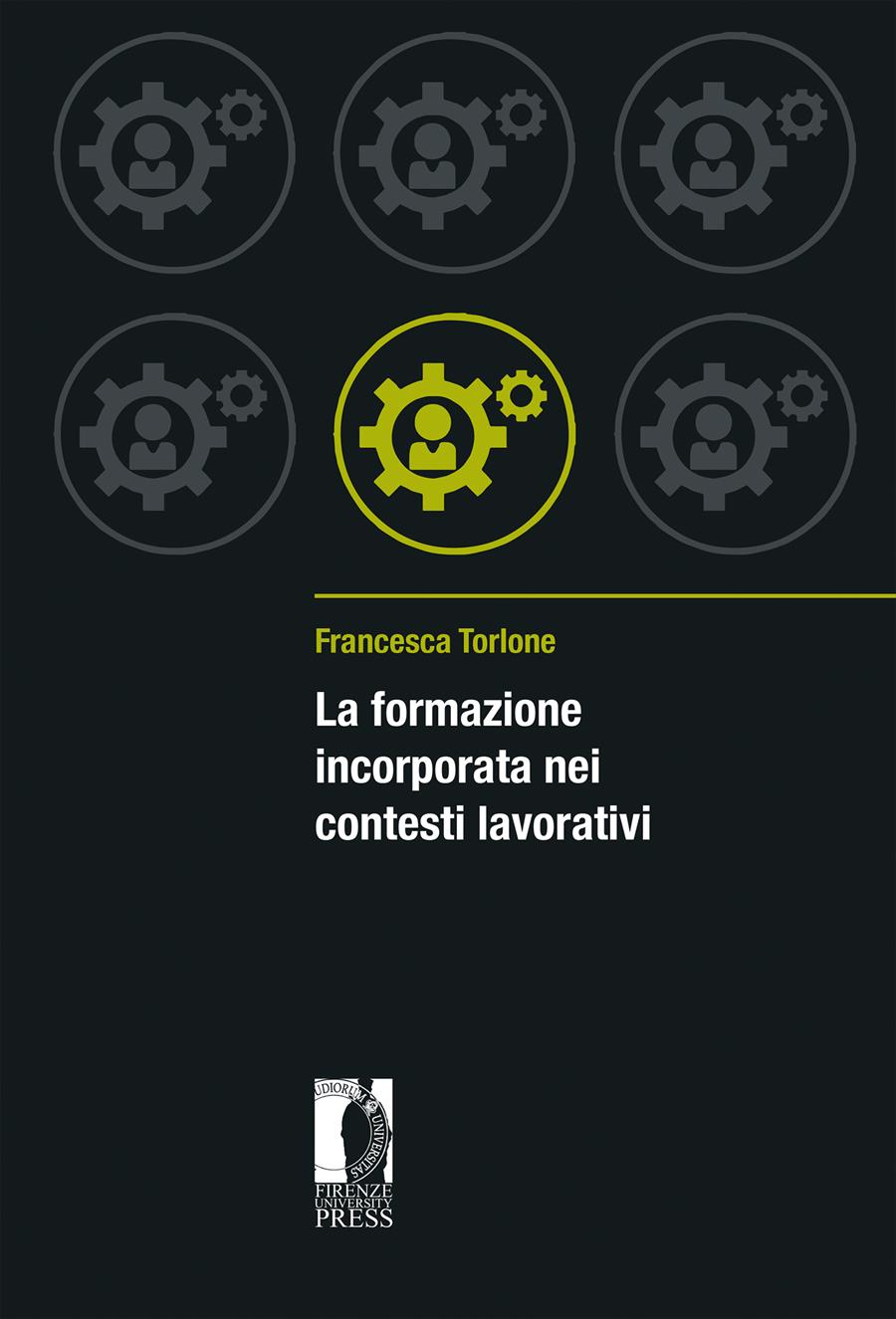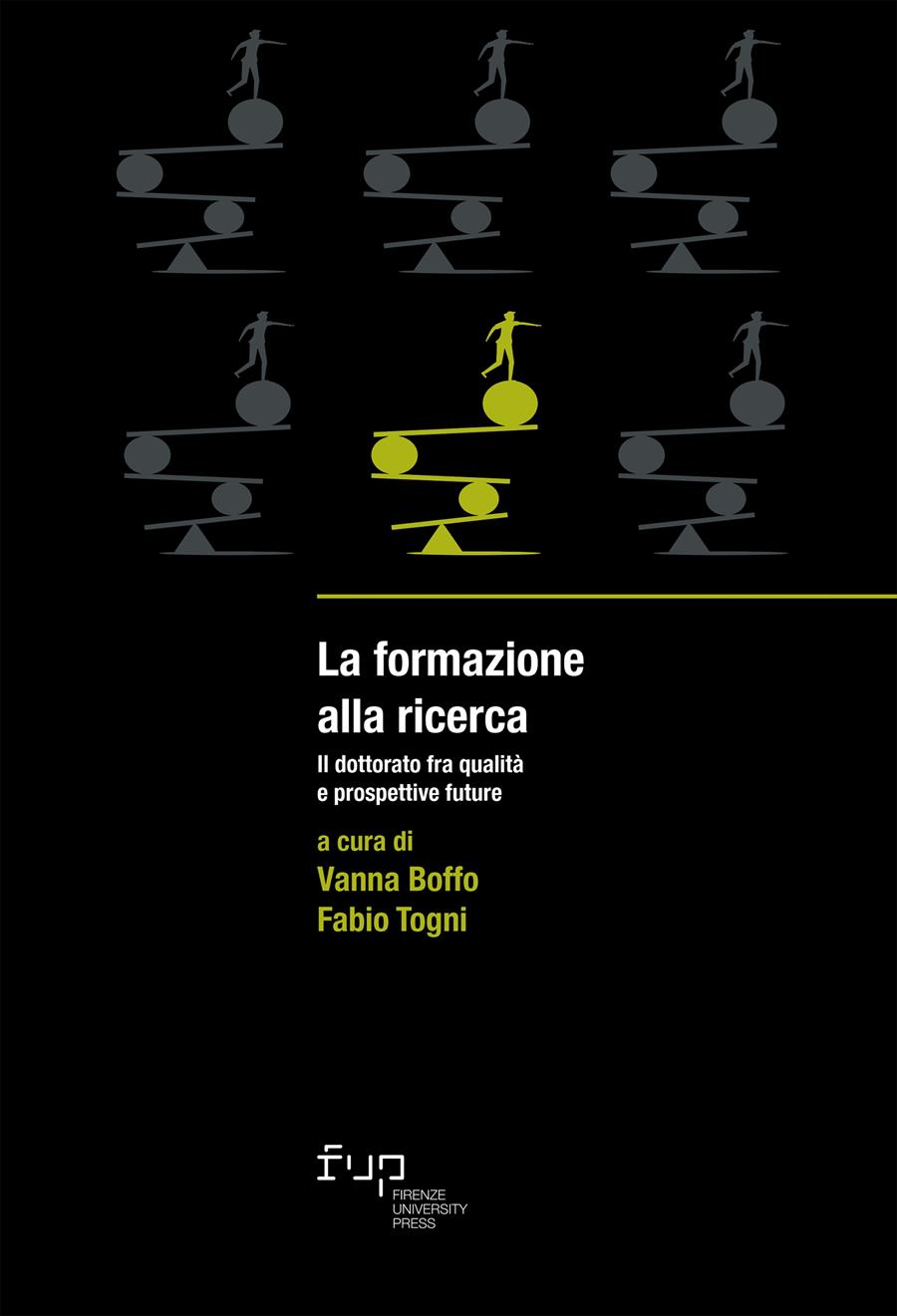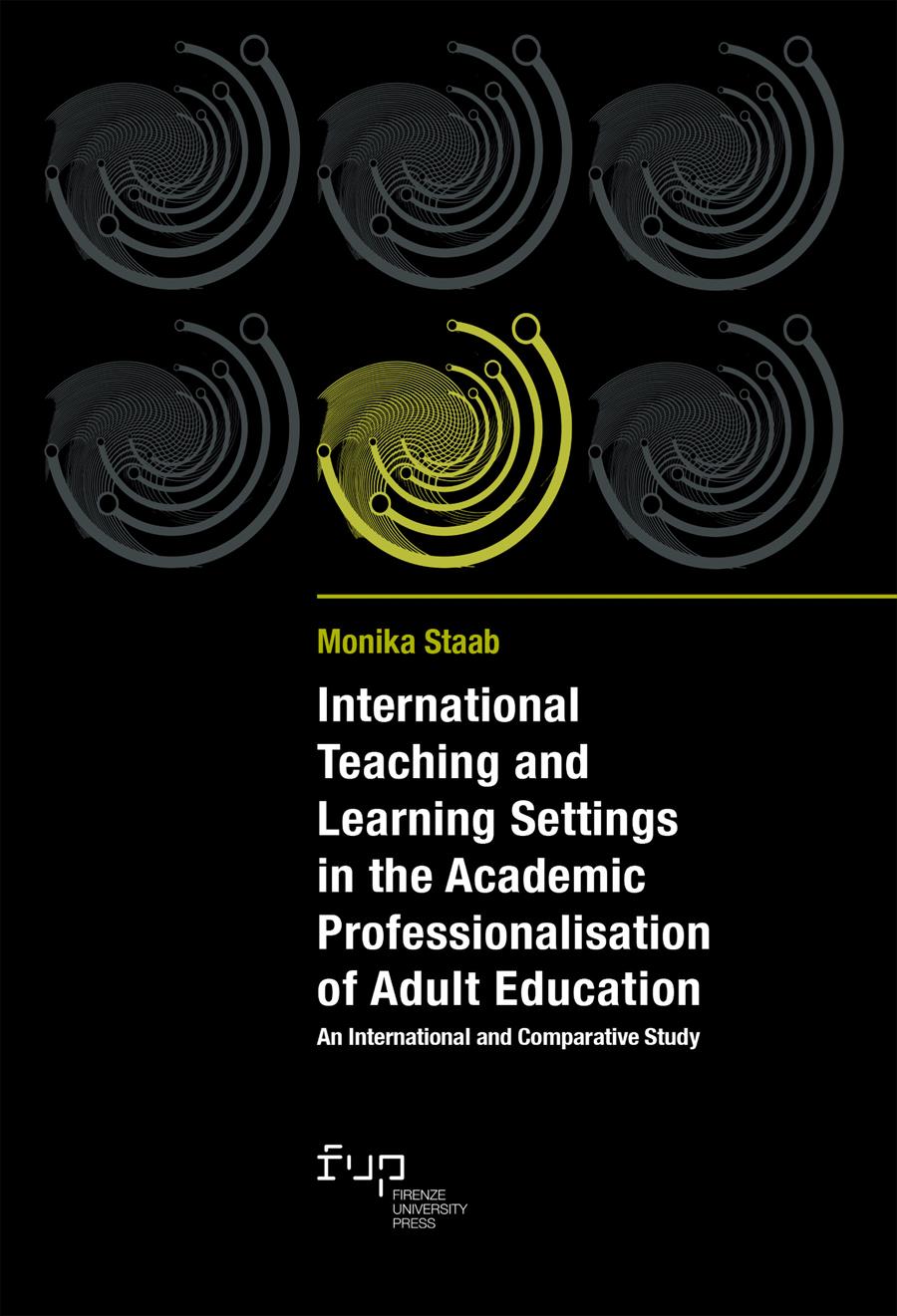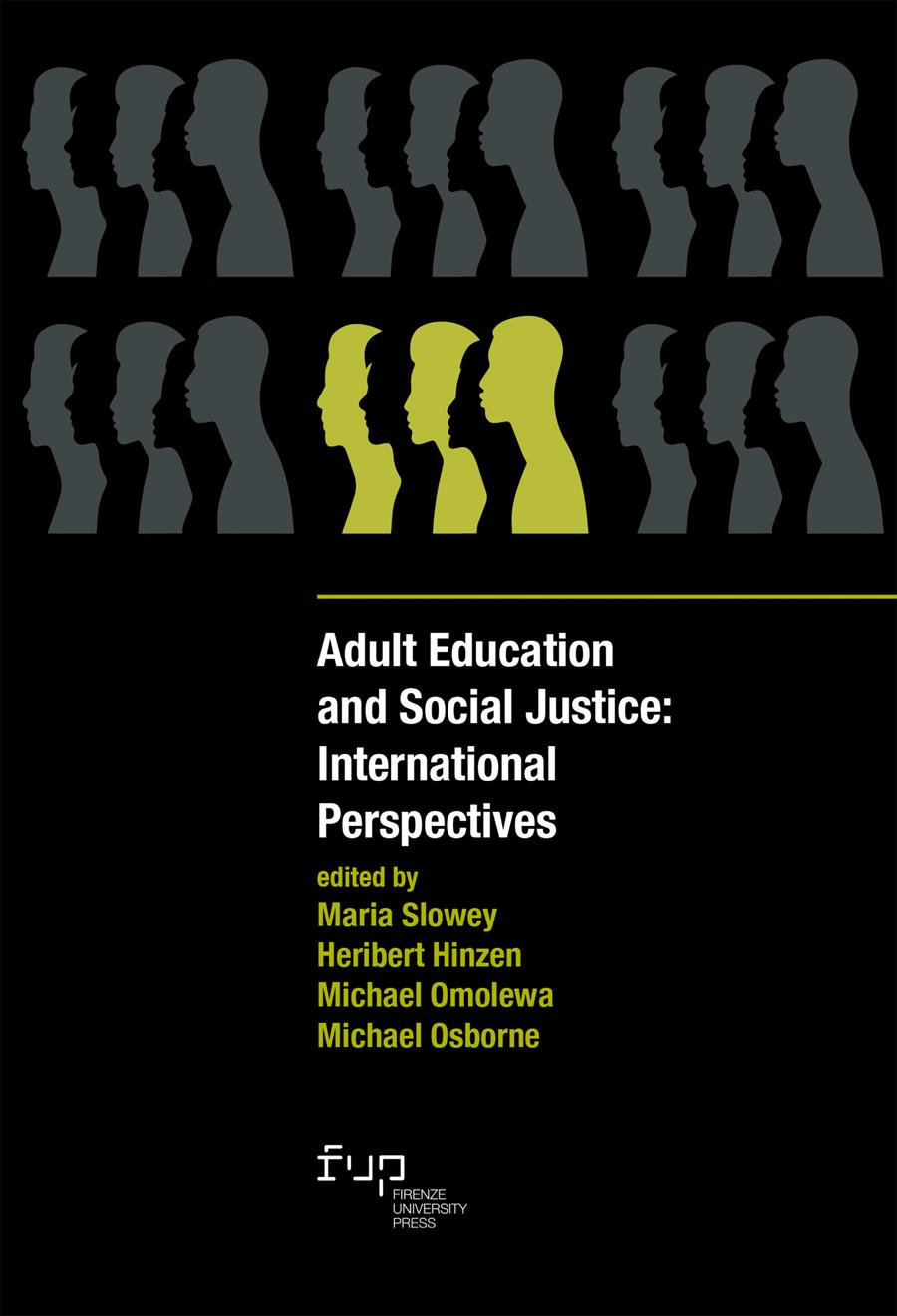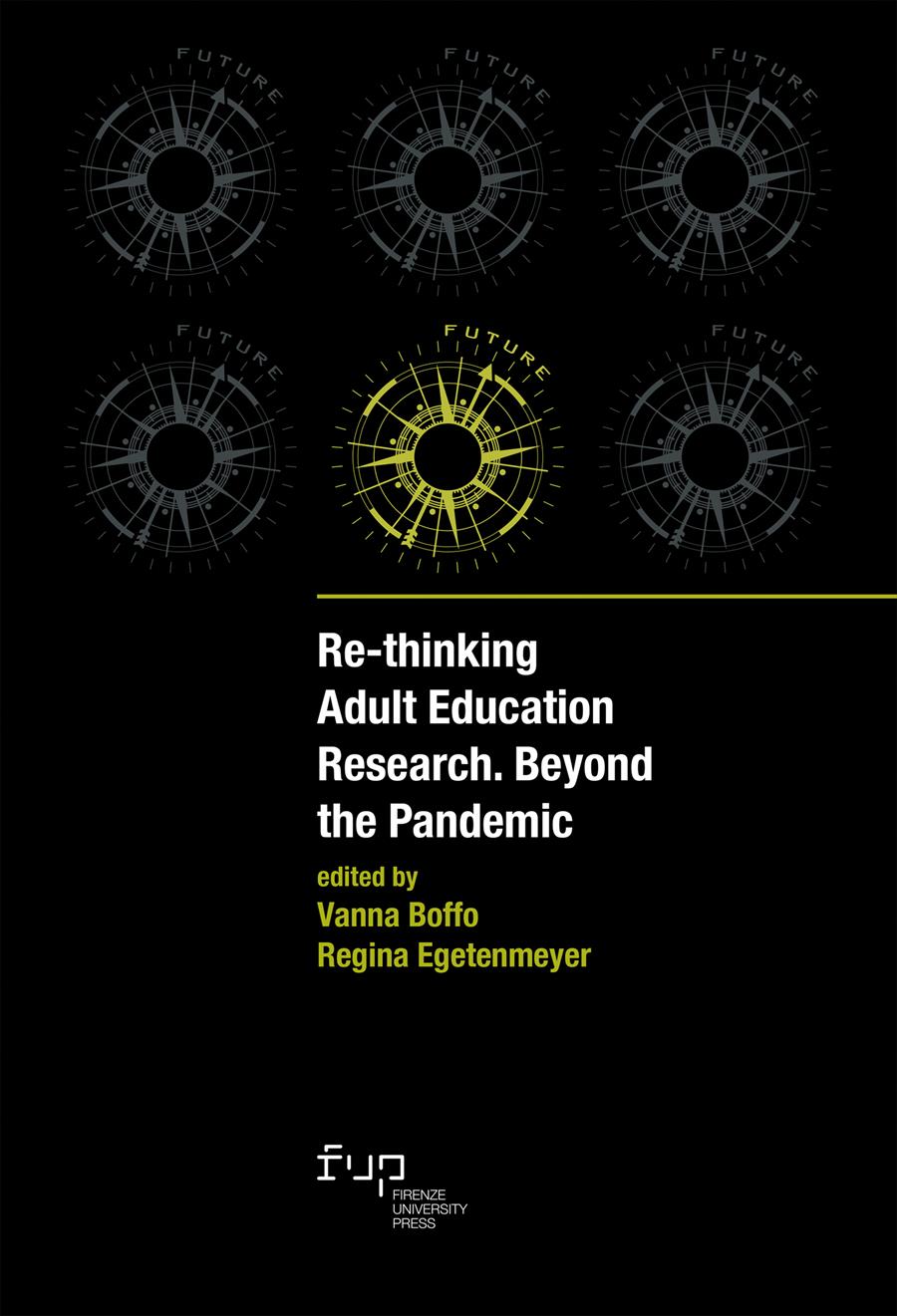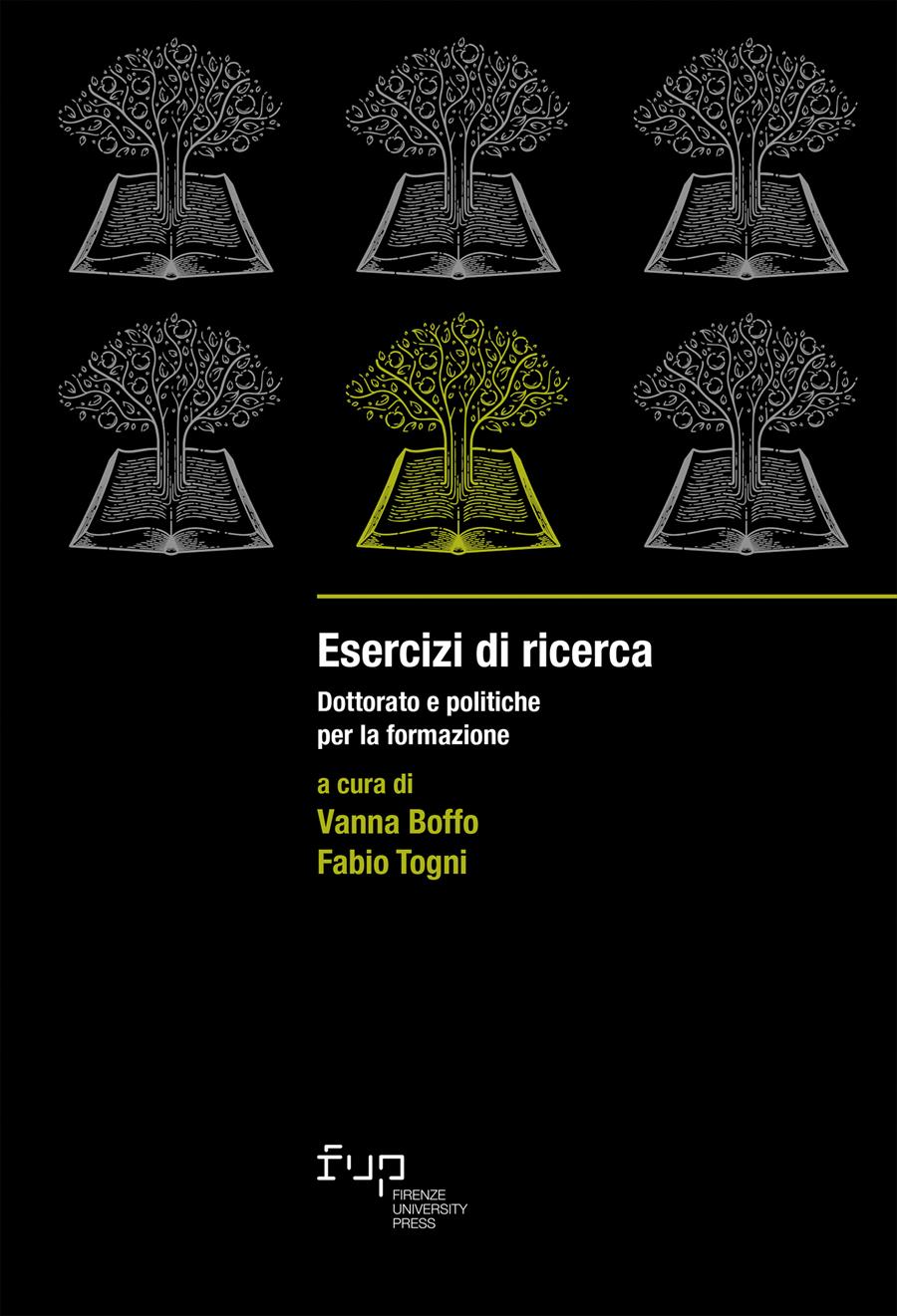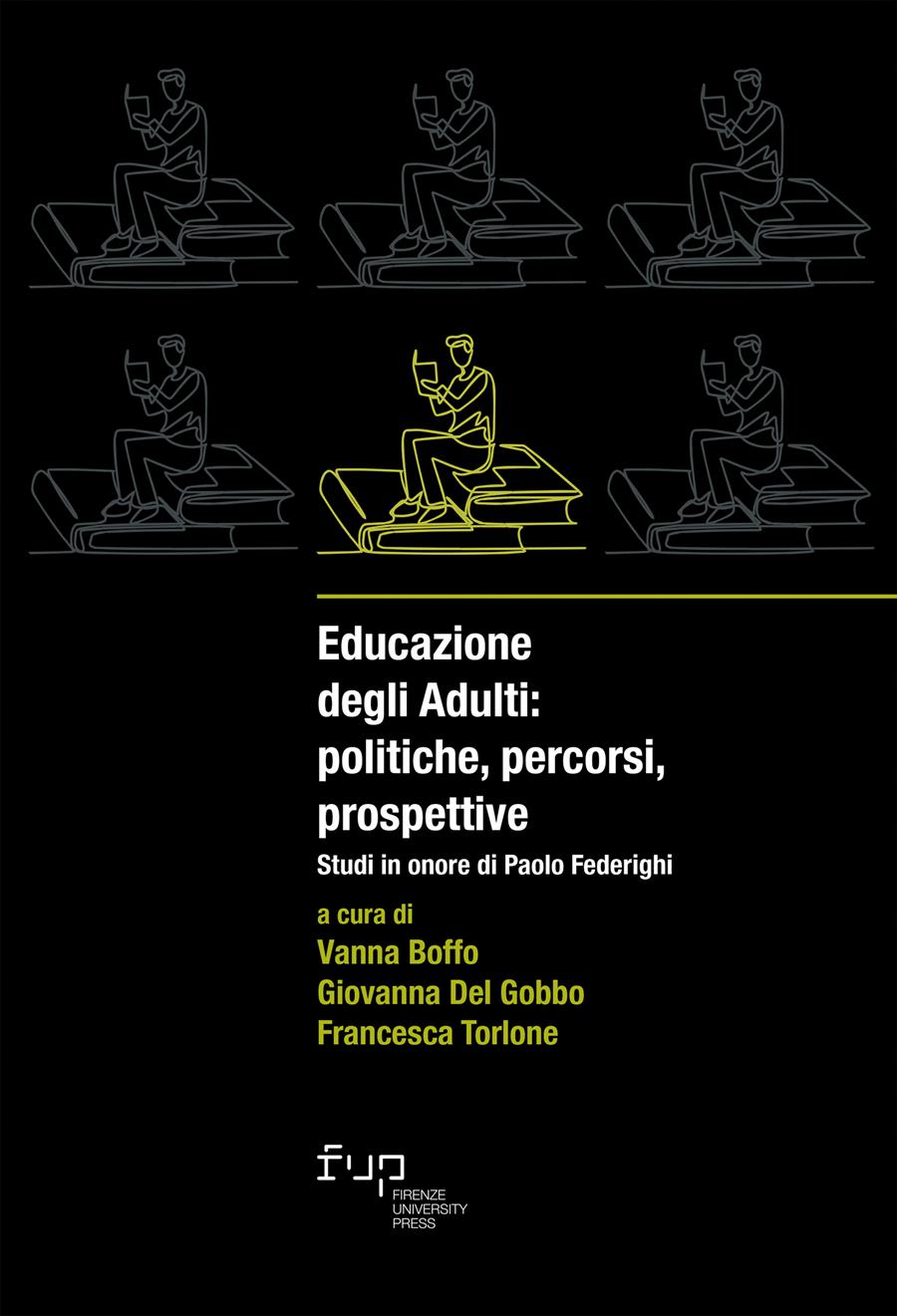La formazione incorporata nei contesti lavorativi
- Francesca Torlone,
Learning devices can be embedded into organizational contexts. Through them learning processes can be intentionally activated as to transform employees while working. Workplaces have their own learning potential due to their high level of structuring and regulation. Their learning potential transform organizational actors while they are in the productive actions. Identifying embedded learning processes helps in intercepting learning valencies of workplace experiences and observing learning actions that can lead to transformative processes. Results of related research activities are presented in the volume. They have been carried out in more than ten years of research implemented in three types of organisations: business, museum, prison. Research experiences are analysed by using a model of study that is based on the reconstruction of the learning processes as they are experienced by the actors considered. Moreover the model is based on the analysis of learning actions that are embedded into the productive and service provision processes. Factors and conditions are analysed as well through which organisations can act on employees transformation.
- Keywords:
- Embedded learning,
- organizational learning,
- workplace learning,
- post-museum,
- prison education,
- DOI: 10.36253/978-88-5518-325-3
- Series: Studies on Adult Learning and Education
- Scientific Board
- Language: Italian
- Subjects: Education
University of Siena, Italy - ORCID: 0000-0003-4772-1588
- Alavi, R., Abdollahi, A., e A. Ali Ahmadi. 2007. “Hidden Curriculum: Research on School Implicit Learning (Case: Scientific Spirit).” Education Journal 90: 33-66.
- Apple, M.W., Au, W., e L.A. Gandin. 2009. The Routledge international handbook of critical education. New York-London: Routledge.
- Azimpour, E., e A. Khalilzade. 2015. “Hidden curriculum.” World Essays Journal 3 (1): 18-21.
- Baldacci, M. 2014. Per un’idea di scuola. Istruzione, lavoro e democrazia. Milano: FrancoAngeli.
- Baldacci, M., Brocca, B., Frabboni, F., e A. Salatin, a cura di. 2015. La buona scuola. Sguardi critici dal documento alla legge. Milano: FrancoAngeli.
- Barton, D., Appleby, Y., Hodge, R., e K. Tusting. 2007. Literacy, Lives and Learning. London: Routledge.
- Bauman, Z. 2007. Modus vivendi. Inferno e utopia del mondo liquido. Roma-Bari: Laterza.
- Bauman, Z. 2009. L’arte della vita. Roma-Bari: Laterza.
- Beck, U. 2008. Costruire la propria vita. Bologna: il Mulino.
- Bélanger, P. 2015. Self-construction and social transformation. Lifelong, lifewide and life-deep learning. Hamburg: UNESCO Institute for Lifelong Learning.
- Bélanger, P., e P. Federighi. 2000. Unlocking peoples creative forces. A transnational study of adult learning policies. Hamburg: Unesco Institute of Education.
- Bélanger, P., e P. Federighi. 2004. Analisis transnacional de las politicas de la educacion y de la formacion de adultos. La dificil liberacion de las fuerzas creativas. Buenos Aires: Mino y Davila, Universidad de Buenos Aires.
- Bell J. 1984. “Education: exposing the hidden curriculum.” Nurs Mirror 158 (12): 20-2.
- Bennett, E. 2012. “A Four-Part Model of Informal Learning: Extending Schugurensky’s Conceptual Model.” In Proceedings of Adult Education Research Conference, Adult Education Research Conference (AERC), 24-31. New York: Saratoga Springs.
- Bernstein, B. 1975. Class, Codes and Control, vol. 3. London: Routledge.
- Bernstein, B. 1990. The structuring of pedagogic discourse. London-New York: Routledge.
- Berthoz, A. 2015. La vicarianza. Il nostro cervello creatore di mondi. Torino: Codice.
- Bianchi, F. 2020. “Vita quotidiana in carcere: attori, discorsi, relazioni.” Educational reflective Practices 1: 117-31.
- Biasin, C. 2008. “Self-directed Learning in Italy. Problems and Possibilities.” International Journal of SelfDirected Learning 5 (2): 1-10.
- Biasin, C. 2011. “L’idée d’autoformation: sens et dimensions dans la culture pédagogique italienne”. Penser l’éducation 29: 17-33.
- Biasin, C. 2016a. “Adultità, Riflessione critica e Apprendimento Trasformativo.” Educazione degli Adulti nella contemporaneità: teorie, contesti e pratiche in Italia, Metis (numero speciale monografico) 5: 139-52.
- Biasin, C. 2016b. L’accompagnement en Italie: points de repère et silences. Tours: International Conference Ethique de l’Accompagnement et agir coopératif. Université François Rabelais, May 27.
- Blaise, M., e J. Nuttal. 2011. Learning to Teach in the Early Years Classroom. Oxford: Oxford University Press.
- Bloom, B.S. 1981. All our children: A primer for parents and teachers. York: NC Cromhin.
- Boffo, V., a cura di. 2006. La Cura in Pedagogia. Bologna: Clueb.
- Boffo, V. 2011. Relazioni educative: tra comunicazione e cura. Milano: Apogeo.
- Boffo, V. 2012. Di lavoro e non solo. Sguardi pedagogici. Milano: Simplicissimus Book Farm.
- Boffo, V. 2016. “Cura di sé e formazione.” La Vita Scolastica, 6-9.
- Boffo, V., e F. Torlone. 2008. L’inclusione sociale e il dialogo interculturale nei contesti europei. Strumenti per l’educazione, la formazione e l’accesso al lavoro. Firenze: Firenze University Press.
- Borghi, L. 1951. Educazione e autorità nell’Italia moderna. Firenze: La Nuova Italia.
- Borghi, L. 1962. Educazione e sviluppo sociale. Firenze: La Nuova Italia.
- Borghi L. 1992. Educare alla libertà. Firenze: La Nuova Italia.
- Boud, D., Keogh, R., e D. Walker. 1985. Reflection: Turning Experience into Learning, New York: Kogan Page.
- Boud, D., Keogh, R., e D. Walker. 1989. “Promoting reflection in learning: a model.” In Reflection: turning experience into learning, edited by D. Boud, R. Keogh, e D. Walker, 18-40. London: Kogan Page.
- Brookfield, S.D. 1985. Self-directed Learning. From Theory to Practice. San Francisco: Jossey Bass Publishers.
- Brookfield, S.D. 1986. Understanding and Facilitating Adult Learning: A Comprehensive Analysis of Principles and Effective Practices. San Francisco: Jossey Bass Publishers.
- Brookfield, S.D. 1996. Developing Critical Thinkers. San Francisco: Jossey Bass Publishers.
- Browne, R. 2012. “Employee Value Proposition.” Beacon Management Review, 29-36.
- Caffarella, R.S. 1993. “Self Directed Learning.” In Merriam, S.B., An update on Adult Learning Theory. San Francisco: Jossey Bass Publishers.
- Caffarella, R.S. 2000. “Goals of Self-directed Learning.” In Conceptions of Self-directed Learning. Theoretical and Conceptual Considerations, edited by G.A. Straka, 37-48. Berlin: Waxmann.
- Caffarella, R.S., e J. O’Donnell. 1987. “Self-directed Adult Learning: A Critical Paradigm revisited.” Adult Education Quaterly 37: 199-211.
- Calvani, A. 2011. Che cos’è la tecnologia dell’educazione. Roma: Carocci.
- Cambi, F. 1986. Il congegno del discorso pedagogico. Bologna: Clueb.
- Cambi, F., e E. Frauenfelder. 1994. La formazione. Studi di pedagogia critica. Milano: Unicopli.
- Cappelli, P. 2008. “Talent Management for the Twenty-First Century.” Harvard Business Review 86 (3): 74-81.
- Casey, H. 2005. Embedded learners. London: NRDC-National Research and Development Centre for Adult Literacy and Numeracy <https://www.theguardian.com/education/2005/mar/15/furthereducation> (2021-05-20).
- Casey, H., Cara, O., Eldred, J., Grief, S., Hodge, R., Ivanic, R., Jupp, T., Lopez, D., e B. McNeil. 2016. Embedding literacy, language and numeracy in post-16 vocational programmes – the impact on learning and achievement. London: NRDC-National Research and Development Centre for Adult Literacy and Numeracy.
- Cedefop. 2009. European guidelines for validating non-formal and informal learning. Luxembourg: Publications Office.
- Cedefop. 2014. Terminology of European education and training policy: a selection of 130 terms, Luxembourg: Publications Office.
- Chambers, E., Foulon, M., Handfield-Jones, H., Hankin, S., e E. Michaels III. 1998. “The war for talent.” The McKinsey Quarterly 3: 44-57.
- Charlop-Christy, M.H., Malmberg, D.B., Rocha, M., e L. Schreibman. 2007. “Treating autistic spectrum disorder.” In The practice of child therapy, edited by R.J. Morris, e T.R. Kratochwill, 299-335. Boston: Allyn and Bacon.
- Cinque, M. 2016. “Il curriculum nascosto: quale definizione?” MEDIC 24 (1): 14-9.
- Colazzo, S., e A. Manfreda. 2019. La comunità come risorsa. Epistemologia, metodologia e fenomenologia dell’intervento di comunità. Un approccio interdisciplinare. Roma: Armando.
- Commissione Europea. 2001. “Realizzare uno spazio europeo dell’apprendimento permanente.” <https://eur-lex.europa.eu/legal-content/IT/TXT/?uri=LEGISSUM%3Ac11054> (2021-05-20).
- Cook, S.H. 1991. “Mind the theory/practice gap in nursing.” Journal Advance Nursing 16 (12): 1462-69.
- Coombs, P.H. 1989. “Formal and Non Formal Education: Future Strategies.” Lifelong Education for Adults: An International Handbook, 57-60.
- Coombs, P.H., e M. Ahmed. 1974. Attacking Rural Poverty: How Nonformal Education Can Help. Baltimore: Johns Hopkins University Press.
- Cornacchia, M. 2018. “Fabbriche di bene: la via umanistica della formazione aziendale a partire dall’esperienza di Adriano Olivetti.” In Federighi, P. Educazione in età adulta. Ricerche, politiche, luoghi e professioni, 197-202. Firenze: Firenze University Press.
- Cranton P., edited by. 1997. Transformative Learning in Action: Insights from the Practice – New Directions for Adult and Continuing Education. San Francisco: Jossey Bass.
- Crespi, P. 1977. “Per una sociologia dell’evento.” Il Politico 42 (3): 517-36 <www.jstor.org/stable/43209980> (2021-05-20).
- Cunti, A. 2000. Pedagogia e didattica della formazione. Napoli: Liguori.
- Cunti, A. 2008. Aiutami a scegliere. Percorsi di orientamento per progettare e progettarsi. Milano: FrancoAngeli.
- Cunti, A. 2015. “Orientarsi da giovani adulti. Educare al desiderio tra formazione e lavoro.” Pedagogia oggi, 335-55.
- Dale, M., e J. Bell. 1999. Informal Learning in the Workplace, DfEE Research Report No. 134. London: Department for Education and Employment.
- De Sanctis, F.M. 1975. Educazione in Età Adulta. Firenze: La Nuova Italia.
- De Sanctis, F.M. 1979. Educazione permanente. Firenze: La Nuova Italia.
- De Sanctis, F.M. 1988. Verso un duemila educativo. Firenze-Prato: Università degli Studi di Firenze-Comune di Prato.
- De Sanctis, F.M., e P. Federighi. 1981. Pubblico e biblioteca: nuove frontiere del lavoro educativo all’uso del libro. Roma: Bulzoni.
- De Saussure, F. 1970. Corso di linguistica generale. Bari: Laterza.
- Del Gobbo, G., Torlone, F., e G. Galeotti. 2018. Le valenze educative del patrimonio culturale. Riflessioni teorico-metodologiche tra ricerca evidence based e azione educativa nei musei. Roma: Aracne.
- Demetrio, D. 2009. L’educazione non è finita. Idee per difenderla. Milano: Raffaello Cortina.
- Dewey, J. 1916. Democracy and Education. New York: Macmillan (trad. it 2000. Democrazia e educazione. Firenze: La Nuova Italia).
- Dewey, J. 1927. The Public and its Problems. Oxford: Holt.
- Dewey, J. 1938. Experience and Education. New York: Macmillan.
- Dewey, J. 1973 (1933). Come pensiamo: una riformulazione del rapporto tra il pensiero e l’educazione. Firenze: La Nuova Italia.
- Dewey, J. 1998 (1899). Scuola e società. Firenze: La Nuova Italia.
- Decreto del Presidente della Repubblica 30 giugno 2000, n. 230. Regolamento recante norme sull’ordinamento penitenziario e sulle misure privative e limitative della libertà (G.U. n. 195 del 22-08-2000).
- DAP-Istituto Superiore di Studi Penitenziari. 2011. “La prevenzione dei suicidi in carcere. Contributi per la conoscenza del fenomeno.” Quaderni ISSP 8 <http://www.ristretti.it/commenti/2013/ottobre/pdf2/issp_quaderni8.pdf> (2021-05-20).
- Eisner, E. 1994. Educational imagination: On the design and evaluation of school program. New York: Macmillan College Publishing Company.
- Engeström, Y. 1987. Learning by Expanding: An Activity-Theoretical Approach to Developmental Research, Helsinki: Orienta-Konsultit Oy.
- Engeström, Y. 2005. Developmental work research: Expanding activity theory in practice. Berlin: Lehmanns Media.
- Engeström, Y., Miettinen, R., e R. Punamaki, edited by. 1999. Perspectives on Activity Theory (Learning in Doing Social, Cognitive and Computational Perspectives). Cambridge: Cambridge University Press.
- Eraut, M. 2004a. “Informal learning in the workplace.” Studies in Continuing Education 26 (2): 247-73.
- Eraut, M. 2004b. “Transfer of Knowledge from Education and Workplace Settings.” In Workplace Learning in Context, edited by H. Rainbird, A. Fuller, A. Munro, 201-221.. London: Routledge.
- Eraut, M. 2011. “Informal learning in the workplace: Evidence on the real value of work‐based learning (WBL).” Development and Learning in Organizations: An International Journal 25 (5): 8-12.
- Eraut, M., e W. Hirsh. 2007. The Significance of Workplace Learning for Individuals, Groups and Organisations. Oxford: Oxford & Cardiff University, ESRC Centre on Skills, Knowledge and Organisational Performance.
- Ericson, T. 2001. “Sensemaking in organizations-Towards a conceptual framework for understanding strategic change.” Scandinavian Journal of Management (17) 1: 109-31.
- European Commission. 2013. Adult and Continuing Education in Europe. Using public policy to secure a growth in skills. Luxembourg: Publication Office of the European Union <https://www.cedefop.europa.eu/en/news-and-press/news/adult-and-continuing-education-europe-using-public-policy-secure-growth-skills> (2021-20-05).
- Errori giudiziari, www.errorigiudiziari.com (01/2021).
- Fabbri, L. 2007. Comunità di pratiche e apprendimento riflessivo. Roma: Carocci.
- Fabbri, L. 2016. “La competenza riflessiva.” In L’agire educativo, a cura di L. Perla, e M.G. Riva, 230-45. Brescia: La Scuola.
- Fabbri, L. 2017a. “L’insegnante post-riflessivo. L’inquiry come strumento di innovazione professionale.” In L’agire scolastico, a cura di A.M. Mariani., 307-29. Brescia: ELS-La Scuola.
- Fabbri, L. 2017b. “Apprendimenti trasformativi per una società sostenibile.” In Società sostenibili e processi trasformativi, a cura di Paolo Piccari,69-83. Milano: FrancoAngeli.
- Fabbri, L., e V., Amiraux. 2020. “Apprendere a vivere in una società multietnica.” Educational Reflective Pratices 1: 5-17.
- Fabbri, L., e M. Giampaolo. 2019. “Apprendimento trasformativo e tecnologie “in uso” come paradigmi di ricerca per l’innovazione delle organizzazioni complesse.” In Digital scholarship tra ricerca e didattica. Studi, Ricerche, esperienze, a cura di P. Federighi, M. Ranieri, G. Bandini. 53-65: Milano: FrancoAngeli.
- Fabbri, L., e A. Romano. 2017. Metodi per l’apprendimento trasformativo. Casi, modelli, teorie. Roma: Carocci.
- Federighi, P. 1988. Consumi educativi nell’età adulta. Genova: Sea.
- Federighi, P. 1991. “Elementi di economia politica della formazione professionale: un’esperienza regionale e nazionale.” In Investire in creatività. La formazione professionale per presente e nel futuro, a cura di F. Cambi, M. Contini, 105-55. Roma: Carocci.
- Federighi, P. 1996. Le condizioni del leggere. Milano: Editrice Bibliografica.
- Federighi, P. 1997. “Le teorie critiche sui processi formativi in età adulta: tendenze e aspetti problematici nei principali orientamenti contemporanei.” In Formazione e processo formativo. Ipotesi interpretative, a cura di P. Orefice, 29-58. Milano: FrancoAngeli.
- Federighi, P. 2000. Glossario dell’educazione degli adulti in Europa. Firenze: BDP-Biblioteca di Documentazione Pedagogica, EAEA-European Association for the Education of Adults.
- Federighi, P. 2006. Liberare la domanda di formazione. Roma: Edup Paideia.
- Federighi, P. 2009. “L’educazione incorporata nel lavoro.” Studi sulla formazione (1) 2: 133-51.
- Federighi, P. 2012. Il Modello dell’Embedded Learning nelle PMI. Pisa: ETS.
- Federighi, P. 2013. Adult and continuing education in Europe. Using public policy to secure a growth in skills. Bruxelles: European Commission Pubblication.
- Federighi, P. 2018a. Educazione in età adulta. Ricerche, politiche, luoghi e professioni, Firenze: Firenze University Press.
- Federighi, P. 2018b. “Approcci trasformativi per la formazione alla leadership al femminile.” Educational Reflective Practices 1: 52.96. DOI: 10.3280/ERP2018-001004
- Federighi, P. 2019. “Metodologia della ricerca nell’educazione degli adulti.” Educational Reflective Practices 1: 39-57.
- Federighi, P. (in corso di stampa). “Transformative adult learning e prospettive critico-trasformative.” Nuova Secondaria.
- Federighi, P., Boffo, V., e I. Dârjan. 2009. Content Embedded Literacy in the Workplace. Firenze: Firenze University Press.
- Federighi, P., Boffo, B., Fabbri, L., Del Gobbo, G., e F. Torlone. 2020. “Il mercato del lavoro dei professionisti dell’educazione e della formazione.” Quaderni di Economia del Lavoro 112: 1-251.
- Federighi, P., e F. Torlone. 2015. La formazione al rispetto dei diritti umani nel sistema penale. Firenze: Firenze University Press.
- Fiol, C.M., e M.A. Lyles. 1981. “Organizational Learning.” The Academy of Management Review (10) 4 (Oct., 1985): 803-13.
- Fiorucci, M. 2020. Educazione, formazione e pedagogia in prospettiva interculturale. Milano: FrancoAngeli.
- Freire, P. 1970. Pedagogy of the Oppressed. New York: Seabury Press.
- Garrick, J. 1998. Informal Learning in the Workplace: Unmasking Human Resource Development. London: Routledge.
- Giroux, H.A. 1983. The Hidden Curriculum and Moral Education. Berkeley: McCutchan Publishing.
- Giroux, H.A. 1992. Border Crossings: Cultural Workers and the Politics of Education, New York: Routledge.
- Giroux, H.A. 2001 (1983). Theory and Resistance in Education. Towards a Pedagogy for the Opposition. Westport, CT: Bergin and Garvey.
- Giroux, H.A. 2009. Youth in a Suspect Society: Democracy or Disposability? New York: Palgrave Macmillan.
- Giroux, H.A. 2011. On Critical Pedagogy. New York: Continuum.
- Giroux, H., e P. McLaren, edited by. 1994. Between Borders. London: Routledge.
- Habermas, J. 1984. The theory of communicative action, Vol. 1: Reason and the rationalization of society. Boston: Beacon Press.
- Hargreaves D. 1978. “Power and the paracurriculum.” In Power and the Curriculum: issues in curriculum studies, edited by C. Richards. Driffield: Nafferton.
- Hart, B., e T.R. Risley. 1968. “Establishing use of descriptive adjectives in the spontaneous speech of disadvantaged preschool children.” Journal of Applied Behavior Analysis 1: 109-20.
- Hart, B., e T.R. Risley. 1974. “The use of preschool materials for modifying the language of disadvantaged children.” Journal of Applied Behavior Analysis 1: 243-56.
- Hart, B., e T.R. Risley. 1975. “Incidental Teaching of Language in the Preschool.” Journal of Applied Behavior Analysis 8 (4): 411-20.
- Hedberg, B. 1981. “How organisations learn and unlearn.” In P. Nystorm, e W. Starbuck. Handbook of Organisational Design. Oxford: Oxford University Press.
- Heger Brian, K. 2007. “Linking the Employees Value Proposition to employee’s engagement and business outcomes: preliminary findings from a linkage research pilot study.” Organization Development Journal, 121-32.
- Hemmeter, M.L. 2000. “Classroom-based interventions: Evaluating the past and looking toward the future. Topics.” Early Childhood Special Education 20: 56-61.
- Hooper-Greenhill, E. 1992. Museums and the shaping of knowledge. London-New York: Routledge.
- Hooper-Greenhill, E. 2000. Museums and the interpretation of visual culture. London-New York: Routledge.
- Howe, N., e W. Strauss. 2007. “The Next 20 Years: How Customer and Workforce Attitudes Will Evolve.” Harvard Business Review 85 (7-8): 41-52.
- ISFOL. 2008. Sostenere la partecipazione all’apprendimento permanente. Misure e azioni in Francia, Germania, Regno Unito, Svezia, vol. 1 Il rapporto di ricerca. Roma: Libri del Fondo Sociale Europeo.
- Jackson, P.W. 1968. Life in Classrooms. New York: Holt, Reinhart & Winston.
- Jarvis, P. 1987. Adult Learning in the Social Context. London: Croom Helm.
- Jarvis, P. 2004. Adult Education and Lifelong Learning. Theory and Practice. New York: Routledge.
- Jarvis, P. 2006. Towards a Comprehensive Theory of Human Learning (vol. 1 of Lifelong Learning and the Learning Society). London: Routledge.
- Jarvis, P. 2007. Globalisation, Lifelong Learning and the Learning Society: Sociological Perspectives (vol. 2 of Lifelong Learning and the Learning Society). London: Routledge.
- Kaptelinin, V., e B. Nardi. 2012. Activity Theory in HCI: Fundamentals and Reflections. Carroll: Penn State University.
- Knowles, M.S. 1950. Informal Adult Education. New York: Association Press.
- Knowles, M.S. 1970. The Modern Practice of Adult Education: Andragogy versus Pedagogy. New York: Cambridge Book.
- Kolb, D.A. 1984. Experiential Learning. Englewood Cliffs, NJ: Prentice Hall.
- Koulaouzides, G., e K. Popovic. 2017. Adult Education and Lifelong Learning in Southeastern Europe. Rotterdam-Boston-Taipei: Sense Publishers.
- La Belle, T.J. 1982. “Formal, Nonformal and Informal Education: A Holistic Perspective on Lifelong Learning.” International Review of Education 28 (2): 159-75.
- Langfield-Smith, K. 1992. “Exploring the need for a shared cognitive map.” Journal of Management Studies 29 (3): 349-68.
- Legge 26 luglio 1975, n. 354. Norme sull’ordinamento penitenziario e sulla esecuzione delle misure privative e limitative della libertà (G.U. n. 212 del 09-08-1975-Suppl. Ordinario).
- Leont’ev, A.N. 1978. Activity, Consciusness, and Personality. Englewood Cliffs, NJ: Prentice-Hall Inc.
- Livingstone, D.W. 1999. “Exploring the icebergs of adult learning: Findings of the first Canadian survey of informal learning practices.” Canadian Journal for the Study of Adult Education (13) 2: 49-72.
- Livingstone, D.W. 2001. Adults’ Informal Learning: Definitions, Findings, Gaps and Future Research. NALL-Centre for the Study of Education and Work-Department of Sociology and Equity Studies. In Education, Ontario Institute for Studies in Education of the University of Toronto, Working Paper, No.21.
- Luhman, N., e E. Schorr. 2002. Il sistema educativo. Problemi di riflessività. Roma: Armando.
- Maitlis, S., e M. Christianson. 2014. “Sensemaking in Organizations: Taking Stock and Moving Forward.” Academy of Management Annals 8 (1): 57-125.
- Manca, S., e M. Ranieri, a cura di. 2017. Reshaping professional learning in the social media landscape: theories, practices and challenges. Bari: Progedit.
- Margolis E., edited by. 2001. The Hidden Curriculum in Higher Education. New York-London: Routledge.
- Marsick, V.J. 1988. “Learning in the Workplace: The Case for Reflectivity and Critical Reflectivity.” Adult Education Quarterly 38: 187-98.
- Marsick, V.J. 2009. “Toward a unifying framework to support informal learning theory, research and practice.” Journal of Workplace Learning 21 (4): 265-75.
- Marsick, V.J., e K.E. Watkins. 1990. Informal and Incidental Learning in the Workplace. London-New York: Routledge.
- Marsick, V.J., e K.E. Watkins. 2001. “Informal and Incidental Learning.” New Directions for Adult and Continuing Education 89: 25-34.
- Marsick, V.J., e K.E. Watkins. 2015. “Informal learning in learning organizations.” In The Routledge Companion to Human Resource Development, edited by R.F. Poell, T.S. Rocco, & G. L. Roth, 236-48. New York: Abingdon, Routledge.
- Marsick, V.J., e K.E. Watkins. 2018. “An update on informal and incidental learning theory.” In Update on informal and incidental learning theory. edited by E. Scurry-Russ, A. Nicolaides, V.J. Marsick, e K.E. Watkins. 9-20. New Directions in Adult and continuing Education 159, Hoboken, NJ: Wiley.
- Marsick, V.J., e M. Volpe. 1999. “The nature and need for informal learning.” Advances in Developing Human Resources 1 (3): 1-9.
- Marstine, J. 2008. New Museum theory and practice: An introduction. Chichester: GBR Wiley.
- Martin J. R. 1994. “What Sould We Do With a Hidden Curriculum When We Find One?” In Changing the Educational Landscape: Philosophy, Women, and Curriculum, 154-69. New York-London: Routledge.
- McBride, B., e I.S. Schwartz. 2003. “Effects of teaching early interventionists to use discrete trials during ongoing classroom activities.” Topics in Early Childhood Special Education 23: 5-17.
- McDonnell, J., Johnson, J.W., e C. McQuivey. 2008. Embedded instruction for students with developmental disabilities in general education classrooms. Arlington, VA: Division on Developmental Disabilities, The Council for Exceptional Children. Prism Series.
- McGee, G.G., Daly, T., e M.J. Morrier. 1999. “An Incidental Teaching Approach to Early Intervention for Toddlers with Autism.” Research and Practice for Persons with Severe Disabilities 24 (3): 133-46.
- McGee, G.G., Krantz, P.J., Mason, D., e L.E. McClannahan. 1983a. “A modified incidental-teaching procedure for autistic youth: Acquisition and generalization of receptive object labels.” Journal of Applied Behavior Analysis 16: 329-38.
- McGee, G.G., Krantz, P.J., Mason, D., e L.E. McClannahan. 1983b. “The Facilitative Effects of Incidental Teaching on Preposition Use by Autistic Children.” Journal of Applied Behavior Analysis 18: 17-31.
- McLaren, P. 1989. Life in schools: An introduction to critical pedagogy and the foundations of education. New York: Longman.
- Melacarne C. 2011. Apprendimento e formazione nella vita quotidiana. Napoli: Liguori.
- Melacarne, C., e L. Fabbri. 2017. “Vicarianza organizzativa e competenze riflessive al lavoro.” Vicarianza e didattica. Corpo, cognizione, insegnamento, a cura di M. Sibilio, 143-49. Brescia: La Scuola.
- Melber, L. M., Cox-Petersen, A. M. (2005), Teacher professional development and informal learning environments: investigating partnerships and possibilities, «Journal of Science Teacher Education», (16)2, pp. 103-120.
- Mezirow, J. 1990a. Fostering critical reflection in adulthood. A guide to transformative and emancipatory learning. San Francisco: Jossey-Bass.
- Mezirow, J. 1990b. “How critical reflection Trigglers Transformative Learning.” In Mezirow, J. D. et al., Fostering Critical Reflection in Adulthood. A Guide to Transformative and Emancipatory Learning. San Francisco: Jossey-Bass.
- Mezirow, J. 1991. Transformative dimensions in adult learning. San Francisco: Jossey-Bass.
- Mezirow, J., edited by. 2000. Learning as transformation: Critical perspectives on a theory in progress. San Francisco: Jossey-Bass.
- Mezirow, J. 2003. Apprendimento e trasformazione. Il significato dell’esperienza e il valore della riflessione nell’apprendimento degli adulti. Milano: Cortina.
- Michaels, E., Handfield-Jones, H., e B. Axelrod. 2001. La Guerra dei talenti. Come sedurre e trattenere i manager di qualità. Monza: ETAS.
- Milana M., e T. Nesbit T., a cura di. 2015. Global perspectives on adult education and learning policy. New York: Palgrave Mcmillan.
- Minchington B. 2006. Your Employer Brand – Attract, Engage, Retain. Torrensville: Collective Learning Australia, Hyde Park Press.
- Ministero della Giustizia-DAP. 1987. “Circolare 30 dicembre 1987, n. 3233/5683. Tutela della vita e della incolumità fisica e psichica dei detenuti e degli internati. Istituzione e organizzazione del Servizio nuovi giunti.” <https://www.giustizia.it/giustizia/it/mg_1_8_1.wp?facetNode_1=1_1(1987)&previsiousPage=mg_1_8&contentId=SDC942015> (2021-05-20).
- Ministero della Giustizia-DAP. 1003. Circolare n. 3359/5809 del 21 aprile 1993 Regime penitenziario. Impiego del personale di polizia penitenziaria. Gestione decentrata democratica e partecipata dell’Amministrazione penitenziaria <https://www.sappe.it/wp-content/uploads/2018/03/3359-5809bis_21-04-1993.pdf> (2021-05-20).
- Ministero della Giustizia-DAP. 2007. “Circolare G.D.A.P. 6 giugno 2007, n. 0181045, I detenuti provenienti dalla libertà: regole di accoglienza. Linee di indirizzo.” <http://www.ristretti.it/commenti/2007/giugno/circolare_nuovi_giunti.pdf> (2021-05-20).
- Mocker, D.W., e G.E. Spear. 1982. Lifelong Learning: Formal, Non-Formal, Informal and Self-Directed. Columbus, OH: ERIC Clearinghouse on Adult, Career and Vocational Education.
- Morin, E. 2004. The meaning of work in modern times, Conference. 10th World Congress on Human Resources Management, Rio de Janeiro, Brazil, August, 20th, 2004.
- Nuissl, E. 1994. “Adult education in Germany.” International perspectives in adult education 13. Bonn: IIZ/DVV.
- Nuissl, E. 2000. Einführung in die Weiterbildung (Introduction to Continuing Education). Neuwied: Luchterhand.
- Nussbaum, M.C. 2001 (1999). Coltivare l’umanità. I classici, il multiculturalismo, l’educazione contemporanea. Roma: Carocci.
- Nussbaum, M.C. 2008. Giustizia e aiuto materiale. Bologna: il Mulino.
- Odom S.L. 2000. “Preschool inclusion: What we know and where we go from here.” Topics in Early Childhood Special Education 20: 20-7.
- OECD. 2012. Better skills, better jobs, better lives: A strategic approach to skills policies. Paris: OECD Publishing.
- Paberzyte, U.J. 2016. Learning in the “Post-Museum”. The role of architecture. Leiden: Leiden University, Master Thesis 2016.
- Parlavecchia, G., e G. Tarchiani. 1991. Verso una biblioteca del pubblico. Milano: Editrice Bibliografica.
- Parricchi, M. 2018. “Benessere, adulti e competenze finanziarie: prospettive di lifelong learning per i senior citizens.” In Educazione in età adulta. Ricerche, politiche, luoghi e professioni, a cura di P. Federighi, 233-38. Firenze: Firenze University Press.
- Pawar, A. 2016. “Employee Value Proposition: A Collaborative Methodology for Strengthening Employer Brand Strategy.” Journal of Resources Development and Management 16: 56-62.
- Piazza R. 2009. Lifelong learning ed educazione democratica in Europa. Milano: Guerini studio.
- Postman, N. 1983 (1978). Ecologia dei media. L’insegnamento come attività conservatrice. Rom: Armando.
- Raelin J.A. 1997. “A Model of Work-based Learning.” Organization Sciences (8) 6: 563-78.
- Rakap, S., e A. Parlak-Rakap. 2011. “Effectiveness of embedded instruction in early childhood special education: a literature review.” European Early Childhood Education Research Journal 19 (1): 79-96.
- Rogers A. 2014. The base of the iceberg. Informal learning and its impact on formal and non-formal learning. Berlin-Toronto: Barbara Budrich Publisher.
- Rossi, B. 2008. Pedagogia delle organizzazioni. Il lavoro come formazione. Milano: Guerini e Associati.
- Rossi, B. 2011. L’organizzazione educativa. La formazione nei luoghi di lavoro. Roma: Carocci.
- Rossi, B. 2012. Il lavoro felice. Formazione e benessere organizzativo. Brescia: Editrice La Scuola.
- Rotondi M. 2000. Un senso per l’apprendere. Spazi di crescita per gli individui nelle organizzazioni. Milano: FrancoAngeli.
- Sandall, S., Hemmeter, M.L., Smith, B.J., e M.E. McLean. 2005. DEC recommended practices in early intervention/early childhood special education: A comprehensive guide for practical application. Longmont: Sopris West.
- Sannino, A. 2011. “Ricerca-intervento in teoria dell’attività. Attualità della tradizione vygotskijana.” Formazione & Insegnamento 9 (3). Lecce: Pensa MultiMedia.
- Schön, D.A. 2006 (1987). Formare il professionista riflessivo. Per una nuova prospettiva della formazione e dell’apprendimento nelle professioni. Milano: FrancoAngeli.
- Schugurensky, D. 2000. The Forms of Informal Learning: Towards a Conceptualization of the Field. Toronto, OISE: University of Toronto.
- Smircich, L., e G. Morgan. 1982. “Leadership: The management of meaning.” Journal of Applied Behavioral Science 18 (3): 257-73.
- Stuart, G., De Jong, J., e L. Kaboolian. 2017. “Embedding Education in Everyday Life.” Standford Social Innovation Review, 42-9.
- Singh, A.P., e J. Dangmei. 2016. “Understanding the Generation Z: the Future Workforce.” South-Asian Journal of Multidisciplinary Studies, 1-5.
- Tanner, C.A. 1990. “Caring as a value in nursing education.” Nursing Outlook 38 (2): 70-3.
- Tansley, C., Turner, P., Carley, F., Harris, L., Sempik, A., Stewart, J. et al. 2007. Talent: Strategy, management, measurement. London: Chartered Institute of Personnel and Development (CIPD).
- Taylor, E.W., e P. Cranton. 2013. “A theory in progress? Issues in transformative learning theory.” European journal for Research on the Education and Learning of Adults 4 (1): 33-47.
- Torlone, F., a cura di. 2016. Il diritto al risarcimento educativo dei detenuti. Firenze: Firenze University Press.
- Torlone, F., e F. Bianchi. 2019. “Le azioni educative in prospettiva trasformativa nei contesti penitenziari: il ruolo della ricerca-formazione.” Educational Reflective Practices 1: 173-92.
- Torlone, F., e P. Federighi. 2020. “Lavoro e apprendimento trasformativo in carcere.” Educational Reflective Practices 2: 5-36.
- Tough, A. 1971. The Adult’s Learning Projects. Toronto: OISE Press.
- Ulrich, D., e N. Smallwood. 2012. “What is talent?” Leader to Leader 63: 55-61.
- UNESCO. 1997. Adult Education. The Hamburg Declaration. The Agenda for the Future. Hamburg: Institute for Education <https://unesdoc.unesco.org/ark:/48223/pf0000116114> (2021-05-20).
- UNESCO. 2009. Global Report on Adult Learning and Education. Hamburg: UNESCO Institute for Lifelong Learning.
- UNESCO-ISCED. 1997. “ISCED-International Standard Classification of Education.” <http://uis.unesco.org/sites/default/files/documents/international-standard-classification-of-education-1997-en_0.pdf> (2021-05-20).
- UNODC. 2006. Policing. Police Information and Intelligence Systems-Criminal Justice Assessment Toolkit. New York: United Nations.
- UNODC. 2012. Introductory Handbook on the Prevention of Recidivism and the Social Reintegration of Offenders. New York-Wien: Criminal Justice Handbook Series.
- UNODC. 2015. Handbook on Dynamic Security and Prison Intelligence. New York: Criminal Justice Handbook Series.
- Van Der Heyden, A.M., Snyder, P. Smith, A., Sevin, B., e J. Longwell. 2005. “Effects of complete learning trials on child engagement.” Topics in Early Childhood Special Education 25: 81-94.
- Vianello, F. 2012. Il carcere. Sociologia del penitenziario. Roma: Carocci.
- Vicari, S. 2008. “Conoscenza e impresa.” Sinergie 76: 43-66.
- Vygotskij, L.S. 1978. Mind in Society. Cambridge: Harvard University Press.
- Wain, K. 1987. “Lifelong education.” Philosophy of Lifelong Education, 35-60.
- Weick, K.E. 1979. The Social Psychology of Organising. New York: McGraw Hill.
- Weick, K.E. 1995. Sensemaking in organizations. Thousand Oaks, CA: Sage.
- Weiss, A., e N. Mackay. 2009. The talent advantage: How to attract and retain the best and the brightest. New Jersey: John Wiley & Sons, Inc..
- Wenger E. 1998. Communities of Practice, Learning, Meaning and Identity. Cambridge: Cambridge University Press.
- WHO. 2007. La prevenzione del suicidio nelle carceri. Geneva: Management of Mental and Brain Disorders-Department of Mental Health and Substance Abuse.
- Wildenger, L.K., McIntyre, L.L., Fiese, B.H., et al. 2008. “Children’s daily routines during kindergarten transition.” Early Child Education Journal 36: 69-74.
- Yang, J. 2015. Recognition, Validation and Accreditation of Non-formal and Informal Learning. Hamburg: UNESCO-Institute for Lifelong Learning.
- Zorec, M.B., e A.J. Došler. 2016. “Rethinking the hidden curriculum: daily routine in Slovene preschools.” Early Child Education Journal 24: 103-14.
- Zucchermaglio, C. 1996. Vygotskij in azienda. Roma: Carocci.
- Publication Year: 2021
- Pages: 148
- eISBN: 978-88-5518-325-3
- Content License: CC BY 4.0
- © 2021 Author(s)
- Publication Year: 2021
- Pages: 148
- eISBN: 978-88-5518-326-0
- Content License: CC BY 4.0
- © 2021 Author(s)
- Publication Year: 2021
- Pages: 148
- ISBN: 978-88-5518-324-6
- Content License: CC BY 4.0
- © 2021 Author(s)
Bibliographic Information
Book Title
La formazione incorporata nei contesti lavorativi
Authors
Francesca Torlone
Peer Reviewed
Number of Pages
148
Publication Year
2021
Copyright Information
© 2021 Author(s)
Content License
Metadata License
Publisher Name
Firenze University Press
DOI
10.36253/978-88-5518-325-3
ISBN Print
978-88-5518-324-6
eISBN (pdf)
978-88-5518-325-3
eISBN (epub)
978-88-5518-326-0
Series Title
Studies on Adult Learning and Education
Series ISSN
2704-596X
Series E-ISSN
2704-5781
